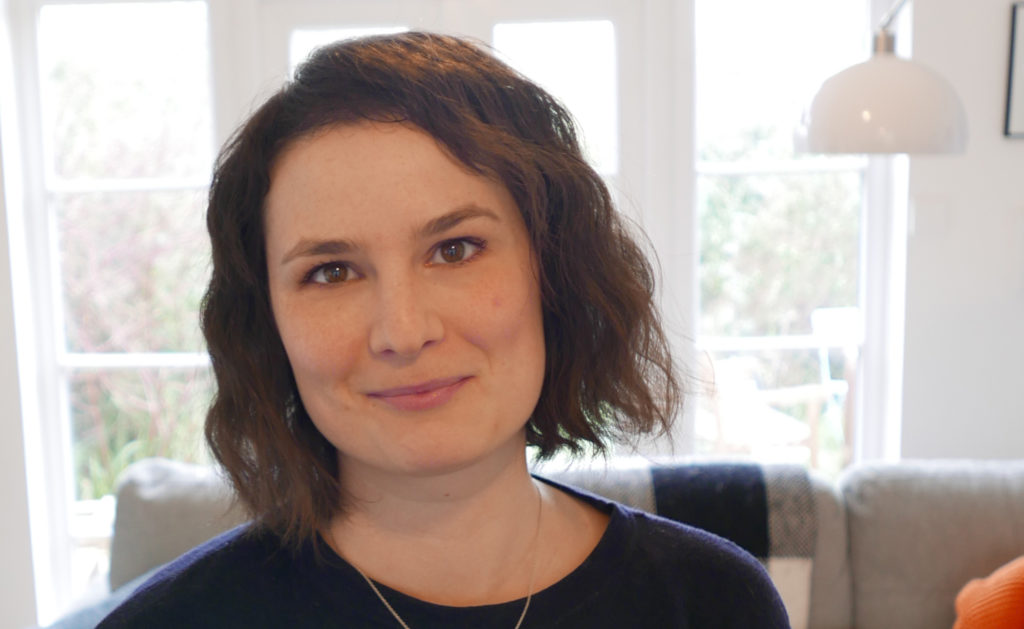‘Stories change lives’: An interview with Katya Balen, Yoto Carnegie Medal winner

We spoke to the winner of the 2022 Yoto Carnegie Medal, the ALCS-sponsored award that celebrates outstanding achievement in children’s writing that is unique in being judged by children’s and youth librarians. Balen also won the Shadowers’ Choice Award, voted for by children and young people.
Katya Balen lives in South London with her partner and her two dogs, Raffi and Mouse. She’s the author of The Space We’re In, which was highly commended for the Branford Boase Award, and October, October, a “beautiful” and “captivating” story, which recently won the 2022 Yoto Carnegie Medal and Shadowers’ Choice Award, sponsored by ALCS. Her third book, The Light in Everything was published in April 2022 by Bloomsbury.
Tell us about yourself.
I live in South London with my partner and our two terrible dogs – one is old and weird, the other is young and just ate my glasses. I mostly write fulltime now, but I’m also co-director of a small charity called Mainspring Arts, which provides creative opportunities for neurodivergent people.

October, October by Katya Balen, won the 2022 Yoto Carnegie Medal
Many congratulations on winning the Yoto Carnegie Medal for October, October. The story was inspired by your father-in-law who lives off-grid, and your own love of mudlarking and the outdoors. Tell us more.
Thank you! My father-in-law moved to the woods about ten years ago – he’s finished building a house there, and he grows lots of his own food. He’s totally off-grid in that he makes all his own electricity and heats his house and water through a woodburning stove. It’s a beautiful way of living, and in some ways it’s more normal than you might expect – he’s got a bath and shower and a TV and underfloor heating. But it’s also really hard work – all of the above need either wood or sun to work properly! I just started thinking about how it would be for a child to grow up there.
I grew up in London, and I love it here. There’s connection and wildness. I discovered mudlarking (searching river mud for historical items or items of value) a few years ago whilst I was writing October, October and it seemed to bring together all the things I love – the city, nature, stories, history, adventure, discovery. It’s so cool to think you can pick something up that no one has touched for thousands of years – a little piece of history, a little connection to lives lived before.
You scooped this year’s Shadowers’ Choice Award as well as the Yoto Carnegie Medal. What does winning these awards mean to you?
Absolutely everything. It’s a huge honour, and it feels like everything I’ve gambled and worked hard for has suddenly paid off. Winning the Shadowers’ Award was particularly special – I’ve only really been published during a pandemic, so knowing my work is connecting with children is just so special.

What do you hope readers will take away from your books?
Whatever they’re looking for! Sometimes you just want to be told a story, sometimes you want to find a part of your own life on the pages. But I suppose I also want them to take away an understanding of how our experiences shape us, and how important it is to think about why someone behaves the way they do, rather than just judging the behaviour itself.
You’ve completed an MPhil researching the impact of stories on autistic children’s behaviour. Can you tell us a little about your findings?
Put simply – stories change lives. The children I worked with were absolutely fantastic, and through stories they began to form connections and understanding in areas where they had previously struggled. It was a small intervention but it made such a big difference, and that’s why I think every single classroom should have story time every single day, regardless of age or ability.
ALCS pays writers secondary royalties as well as champions authors, writers’ rights and creativity. Can you tell us a little about your experience of making a living out of writing?
I won’t sugarcoat it – being a writer and surviving on your advances is really hard. I’ve made a lot of sacrifices, as has my partner, and if it weren’t for things like ALCS and PLR then I know a lot of writers, including myself, would struggle significantly more.
Interview by Miriam Foley.
